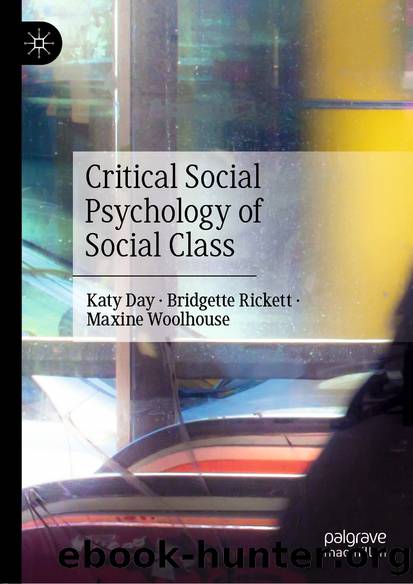Critical Social Psychology of Social Class by Katy Day & Bridgette Rickett & Maxine Woolhouse

Author:Katy Day & Bridgette Rickett & Maxine Woolhouse
Language: eng
Format: epub
ISBN: 9783030559656
Publisher: Springer International Publishing
The authors theorised that this way of talking about social class is a means to present college life and its inhabitants as âclass blindâ and so impervious to the impact of classed inequalities and the resultant stigmatising identities. In addition, it was clear in this published data that if a classed identity was claimed, this was positioned as a matter of personal choice. We argue that key points from important critical race scholarship (e.g. Wise, 2010) about âcolour-blindnessâ can be helpful here too. Colour-blindness and class blindness are shored up by differing patterns of oppressive systems of control and are often dangerously positioned as competing (e.g. âit is not about race it is about classâ). However, they can often be âbedfellowsâ in that they both take the form of neoliberalism (Aramburu, 2020) and are weaponised to promote individualism, through the meritocratic and personal choice discourses that seep down into our everyday lives. This ideology of âclass blindnessâ, while seemingly emancipatory through the reiteration of the discourse of a classless society, anchors the idea that class does not matter even when it blatantly does (Smith & Redington, 2010). In addition, as Cook and OâHara (2019) argue, it also allows the middle-class to view their selves and their lives as earnt and without reference to continued, unfair, classed division and difference.
In contrast to this prevalent construction of the classless society promoted in âclass blindnessâ, these important examples of research continue to draw attention to late capitalist ideology around what is theorised as the âfluidity of classâ. This includes a portrayal of the class system and those in it as existing without boundaries, where hard work and merit, as with Thomas and Azmitiaâs work (2014), achieve social mobility. The fluidity of class is also tended to be understood along linear and unidimensional lines where working-class peoples, while being painfully conscious of their classed identities and the inequalities bestowed upon them, see upwards social mobility as a way to escape some of these inequalities along with their stigmatised working-class identity. Therefore, in this context, classed identities are fluid, and the class system is one without boundaries, and therefore, the working-class and poor are simply required to use drive, ambition and hard work to gain access to middle-class privileges by virtue of this individualised merit. This discourse echoes historical and prevailing scientific discourse around intelligence and social mobility presented in Chapter 2.
For instance, research by Schwartz, Donovan, and Guido-DeBrito (2009) found a reproduction of the discourse of meritocracy in college student menâs talk about their futures, where education and hard work were referred to as something that would allow them to achieve social mobility in a fluid, unidimensional classed system. Here, students were very much conscious of their social class in relation to others and unfair limitations that posed and saw personal characteristics such as the way people spoke and dressed (middle-class) as signifiers of class. The researchers reported stories of how some of the students used these signifiers to imitate middle-classness so they could pass as middle-class and therefore reach career goals.
Download
This site does not store any files on its server. We only index and link to content provided by other sites. Please contact the content providers to delete copyright contents if any and email us, we'll remove relevant links or contents immediately.
| Administration & Medicine Economics | Allied Health Professions |
| Basic Sciences | Dentistry |
| History | Medical Informatics |
| Medicine | Nursing |
| Pharmacology | Psychology |
| Research | Veterinary Medicine |
Bioenergetica by Alexander Lowen(1472)
The Child in You by Stefanie Stahl(1255)
No Bad Parts by Richard C. Schwartz(1238)
Noise: A Flaw in Human Judgment by Sunstein Cass R. & Sibony Olivier & Kahneman Daniel(1187)
The Data Detective by Tim Harford(1133)
Chatter by Ethan Kross(1063)
The Science of Rapid Skill Acquisition by Peter Hollins(918)
The Quantum Psychiatrist: From Zero to Zen Using Evidence-Based Solutions Beyond Medication and Therapy by Biswas Dona(874)
Freedom by Sebastian Junger(855)
The Montessori Baby by Simone Davies(849)
Maps of Meaning: The Architecture of Belief by Jordan B. Peterson(749)
The Science of Self-Learning: How to Teach Yourself Anything, Learn More in Less Time, and Direct Your Own Education (Learning how to Learn Book 1) by Peter Hollins(731)
Evolution Gone Wrong: The Curious Reasons Why Our Bodies Work by Alex Bezzerides(704)
Sadomasochism and the BDSM Community in the United States by Stephen K. Stein(692)
Anxiety For Dummies by Charles H. Elliott & Laura L. Smith(667)
Why Sex Doesn't Matter by Olivia Fane(661)
Disconnected by thomas Kersting(659)
Jung - The Key Ideas: Teach Yourself (TY Philosophy) by Ruth Snowden(628)
The Mechanics of Passions: Brain, Behaviour, and Society by Alain Ehrenberg(615)
